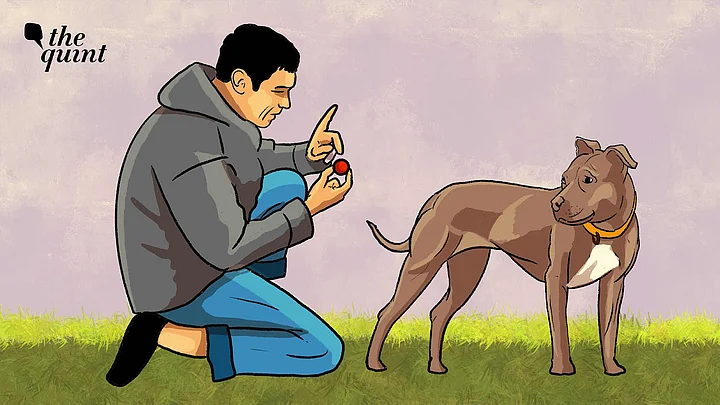On 12 July, an 82-year-old woman in Lucknow was bit by her pet pit bull, a mid-sized female dog, named Brownie. Denied treatment at the first hospital that Sushila Tripathi was rushed to, she was "conscious" at the second hospital she was taken to, as per her son Amit.
A few hours later, however, Tripathi succumbed to her injuries. In a video that emerged two days later, Amit was seen carrying Brownie towards a van, which took the dog to an animal shelter. He told reporters that his decision to single-handedly carry his pet to the van was to show everyone that his pet "is not aggressive."
The incident reignited the debate on whether some dogs, especially pit bulls, are inherently too dangerous to be a pet.
In February this year, two pet pit bulls mauled their 40-year-old owner to death in Haryana’s Yamunanagar; and the same month, an American Bully dog attacked and injured a six-year-old child in Gurugram.
While most reported cases attribute attacks to a ‘violent’ or ‘aggressive’ dogs, The Quint spoke to dog behavioural experts, veterinarians, trainers and breeders that emphasised on the role an owner plays in moulding their pit bull’s behaviour, temperament and actions.
They laid importance on the role played by training (or the lack of) and said that the responsibility of the animals lies solely with the owner. The piece attempts to navigate how pet owners and the care provided by them can shape the behaviour of their pets.
The Incident in Lucknow
The Quint spoke to renowned dog trainer and founder of India’s flagship K9 School Adnaan Khan, who pointed out that it is not the breed but the lack of discipline and exercise provided to the animal which can possibly lead to such incidents. “The presence of neglect towards the pit bull, if any, leads to further complications,” he said.
Sushila’s family said that their dog Brownie attacked her in the courtyard. Her bereaved son Amit told Aaj Tak that the dog was usually “triggered by doorbells.” He had said, “Since I was not home… It’s just my guess that someone rang the doorbell and Brownie got triggered. My mother used to take care of its meals and other routine things.” The family has a female Labrador too, and Brownie the pit bull spent most of its time on their terrace.
Amit told News 24 said that their family did not take Brownie out of their house which was "big enough for the dog to play in."
Khan explained that Brownie’s behaviour can possibly be attributed to a combination of lack of social interaction, an unfit environment, and even genetics. The prevalence of crossbreeding can cause a dog to become aggressive.
Khan said:
“From the interviews, it appears that due to lack of exercise and any kind of stimulation, the dog was left on the terrace. It probably got agitated whenever the doorbell rang because maybe it wanted to get out and play, chase or run. The dog’s environment was limiting, and maybe that’s why it lashed out.”Adnaan Khan
Khan’s explanation is only one theory.
Gene Play
Several dogs are mated regardless of their possibly clashing behavioural traits being passed on to their offspring. The result of this random breeding is a population of dogs with a wide range of behavioural pre-dispositions. Dr. Bhanu Sharma, a vet at Delhi’s Max Vets spoke to The Quint and said that “due to hormonal fluctuation, violent behaviour is often seen in male, un-neutered dogs.”
Sharma said:
“The genetics, hormones and breeding play a huge role. Unneutered male dogs tend to have fluctuating testosterone levels, which directly contributes to aggression. In this case, the dog is female, so its hormones don’t come into question. It is pertinent to evaluate and treat each dog as an individual, regardless of their stereotypically assumed traits.”Dr Bhanu Sharma
Both Sharma and Khan said that the demonisation of certain breeds of dogs as “violent” is problematic.
The Quint also spoke to Tandrali Kuli from Friendicoes, a popular animal shelter in Delhi, who said, “Whoever adopts a pit bull needs a strong personality. They need to be confident because the pit bull is a strong dog. It is not aggressive but it needs a firm hand.”
Emphasising on the need to encourage social interaction between pit bulls and other pets, Kuli said that if a dog is bored or frustrated, either physically or mentally, one will see destructive behaviour and signs of anxiety.
“Dogs don’t just bite. They give you plenty warning signs after a trigger. The onus is on the people around the dog, they have to identify these triggers correctly. If a dog bites you, in most cases you have missed the earlier signs it provided. You must expose your Pitties to all possible environments as a puppy – from walks to a drive, interactions with other dogs and widespread socialisation.”Tandrali Kuli, Friendicoes
She said that in the pit bull’s case, the bite can be dangerous solely “because of the force of the bite, nothing else.” Kuli said that the only key is to be “ able to read your dog well and identify these triggers.”
